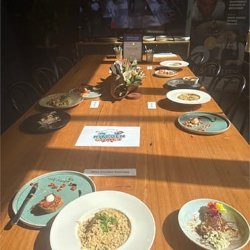Gas, electricity, food… all things people need to survive.
The other day I panicked because I suddenly couldn’t use my card—though I’d just been going about life as usual. When I looked into it I found that I had almost no money left in the bank. It turned out that my spending had increased by more than 100,000 yen over the past two months, making me worried about just how long these price increases are going to continue.
In April, the national government stepped in and reduced value-added tax (VAT) to zero on 44 essential items. They include staple foods like carbohydrates (bread, rice, potatoes, and pasta), thirteen different vegetables, five fruits, four types of legumes, dairy products (milk, yogurt, and cheese), twelve types of meat and fish (including dried salted cod, canned tuna, and eggs), and oils (olive oil, vegetable oil, and butter).
The supermarkets are making a huge fuss about the zero tax, with banners and posters making the stores more festive. If they then put the non-taxed items on sale, it gets so confusing that you have no idea what numbers to look at anymore.

Here’s an example. A kilogram of long-grain rice is normally 1.19 euros, but it’s now 1.12 euros without the 6% sales tax.

This is how things look in the store.
But if you actually stop and think about it, picking just 44 items instead of eliminating the 6% sales tax on all essentials doesn’t make any sense. Doesn’t it just end up being a special promotion for those 44 items?
There’s also no guarantee that retailers won’t use the zero VAT as an excuse to raise prices and boost their profits. Even if a 106-yen item is now 100 yen without sales tax, the retailer can just raise it to 105 yen, for example, and keep it above 100. In the end, consumers just end up paying more money to bump up sellers’ profit margins.
Still, while I’m grateful for the shift that’s happening right in front of me, I can’t shake the thought that costs are not going to go back down to where they were even if the war ends.
Put another way, bank interest rates are also up in the EU, which I’ve heard has doubled loan repayment amounts for some people. More people are drowning in their mortgages and losing their homes. Meanwhile, the real estate market continues to be so hot that real estate agents can’t even sell a place if they don’t have it built. The reason for this is, of course, overseas buyers—particularly Americans in recent years. I’m guessing they can easily afford homes that would be out of reach for most Portuguese people.
This year, the government stopped issuing the Golden Visas that granted residency to people who invested 500,000 euros in Portuguese real estate—but the high-end properties that Golden Visa holders were after were never meant for the Portuguese anyway, and if anything, abolishing the program is probably hurting the local businesses that depended on the Golden Visa residents.
Portuguese infrastructure has come a long way in the last few years, and run-down parts of town are becoming modernized and chic. Portugal’s beautiful blue oceans and beautiful blue skies were enough, but the country is getting more and more posh while the Portuguese themselves seem to be getting poorer and poorer.




















































